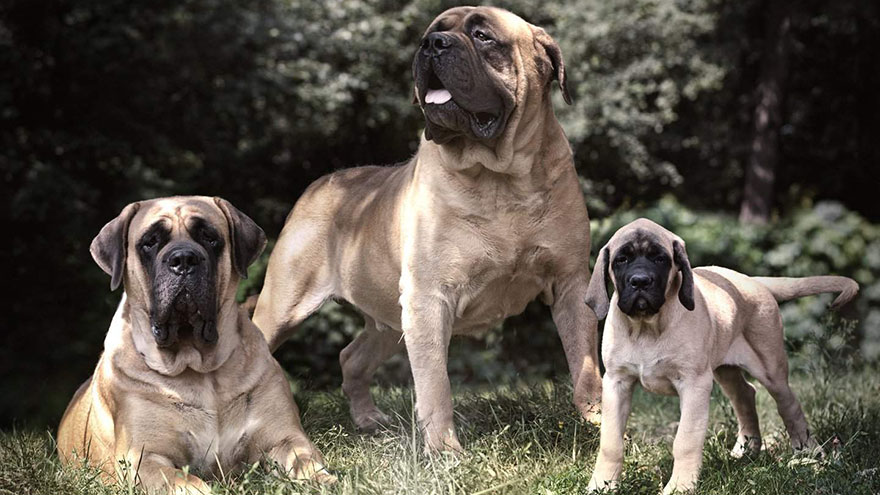English Mastiff Health Guide
As with any purebred dog, it is best to begin your search for a Mastiff puppy by visiting at least three reputable breeders. This way, you will have the opportunity to look closely at the living conditions, as well as the interaction between the breeder and puppies.
Because of the dog’s huge size, proper socialization and good bloodlines make a tremendous difference in the personality and behavior of an individual pet.
Health Problems in the English Mastiff
There are potential health issues that Mastiff owners should be aware of, again because of the tendencies of large dogs to develop certain conditions. With any large breed, it is good to ask the breeder about hip dysplasia, a degenerative joint disease related to arthritis. This condition leads to pain when moving and even to limited movement.
Serious cases may require surgery or at minimum, on-going treatment with therapy and/or medication. A reputable breeder should be open to questions about detecting this condition early, using the Orthopedic Foundation for Animals (OFA) radiographic test.
The Mastiff, and other large breeds, are also prone to “bloat”, in which the stomach twists and blocks food from passing through the intestines. This condition often leads to serious health problems and can even be fatal. Therefore, ask the breeder and your veterinarian about bloat, as well as gastric torsion. One thing you can do, as an owner to help prevent this is to feed the Mastiff two or three small meals during the day, opposed to one large meal.
Additionally, you want to eliminate the situation by not allowing the dog to gulp large amounts of food and water at any one time. It would be best not to exercise your Mastiff right before or after a meal, allowing at least an hour after eating for any real exercise. Then, the breed is prone to eye problems, as well as the thyroid gland.

Exercise in the proper amounts is key to the health and happiness of your Mastiff. With this being such a large breed, it tends to gain weight easily. In fact, a Mastiff can become overweight and unhealthy unless the diet and exercise are correct. One owner has jokingly reported that a Mastiff will eat anything that is not nailed down. While this may be a slight exaggeration, the Mastiff does have a good appetite, needing a solid diet to stay strong and healthy. Mastiffs typically do best on a diet that includes about 20% to 25% protein and a fat level in the middle range, perhaps about 15%.
Too much of any of these ingredients, as well as too much calcium, may lead to bone and tendon problems. Therefore, you want to consult with your breeder and veterinarian for the proper contents and amounts to feed your Mastiff. It is fine to feed a good quality, premium commercial food if you follow the directions that come with the package.
You may also want to feed lean meats and some vegetables if you prefer to prepare food for your dog. However, be careful not to include too many table scraps and high fat/protein foods that can cause problems. Getting some guidance from your veterinarian and from other owners with Mastiff experience is always a great idea.
Some new owners may think that because of the dog’s great size, it will eat a lot more than any other dog but in reality, the Mastiff eats about as much as dogs that are considerably smaller, such as the German Shepherd.
It is important to make sure that your puppy gets the right amount of food with the right ingredients, so you can avoid many of the health problems with a large, overweight dog later in life.
Read More About English Mastiff
- English Mastiff Breed Information
- English Mastiff : 10 Most Common Questions
- English Mastiff Training Guide
- Owning a English Mastiff : Breeder Recommendations

